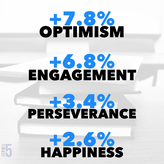Can Teachers Actually Increase Student Well-Being in Just a Couple Minutes a Day? [...Yes!]7/30/2020  During the 2019-2020 school year (before COVID 19 smacked us in the face) I decided to up my game a bit more regarding positive psychology in education, so I conducted a study in my classroom. I had been implementing a number of positive priming techniques at the beginning of classes, but I wasn’t really measuring anything to gauge impact or level of success. I decided to create a 25-day study and really measure some things. Who were the subjects? I collected data from 56 high school students ranging from 9th to 12th grade. We didn’t use any names. I gave each student a random “secret number” that was assigned to their assessments. I didn’t know who had what number; I could only see the trend within each student number. They just had to write their number somewhere so they could put it on their assessments (and yes, a couple of students forgot their number after the first assessment, so we had to do some problem-solving). What did they do? First, I gave them a baseline test to assess their level of well-being. It is based on concepts created by Margaret L. Kern, Lisbeth Benson, Elizabeth A. Steinberg, and Laurence Steinberg of the University of Pennsylvania and Temple University. The assessment is intended to measure the students’ well-being regarding 5 categories:
What were the results? After the 25 days were completed, students took the EPOCH assessment again. All 5 areas increased, but some more than others.
I was very pleased with the outcome after just 25 days, and I immediately began to think about how I could modify things to impact the categories that had smaller gains. Would I do anything differently? I continue to learn more and more pretty much every day. Here are a couple of the tweaks I would make to make things even more impactful:
What did the students say? A vast majority of students really enjoyed the daily activities. It became part of their routine, but one that made them feel good. Many students commented on how they were starting to notice things throughout the day that they could write down the next day. They were beginning to change the way their brain was viewing and scanning the world. There were also students that said it seemed like it was positively impacting their extracurriculars--they felt more focused and calm during competition. In essence, the students enjoyed the experience and felt it positively impacted them even beyond the classroom. *Click here to see the official PDF describing the EPOCH categories. **If you are interested in the survey I used, or have any questions, just shoot me an email at [email protected].
2 Comments
3/3/2021 12:32:40 am
What a fantastic study to do with the young people. I go in and out of schools to teach young people on all social issues including drug, alcohol and knifecrime awareness.
Reply
Leave a Reply. |

 RSS Feed
RSS Feed
